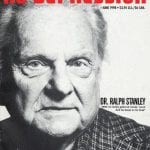Johnny Bush – Horse Opera
ND: Are fans who consider you a real country traditionalist able to accept the Kronos Quartet as country music?
DW: No, it’s not country music. It’s classical music on a country record.
ND: Both of you are singers who also write. How do you decide what material by other people to do? And why not just record all your own stuff?
JB: Good question. I’m the kind of writer who never writes unless there’s a need for a song. I wrote two songs and helped Justin [Trevino] on the two that he wrote, but I didn’t claim any part of them. I love lyrics — songs that tell a story — and try to convey what I feel to the listener, through the feeling in my voice. That’s why I almost have to have complete control, which I do with Watermelon. I have control over material, musicians, studio and producer. And I bring the producer who produced all my old hits back when I started recording for Stop Records [Tommy Hill]. He knows exactly what I’m after.
ND: Is it too abstract to ask you exactly what you’re after?
JB: Sometimes I wish I knew. A feeling. To see a crowd reaction to what I’m doing. Just to keep on doing what I’ve been doing, and not change it. I wouldn’t know what to do if they came in there with a producer who said, “I want you to sing this, and I want you to sing it this way.” I guess I’d probably try, but I wouldn’t be happy doing it.
ND: How about you, Don? What do you look for in material?
DW: Well, I’ve got songs in my mind that I’ve been knowing for years and years and years. I call ’em “stickers” — you know, they just stick in your mind. Those are the things that I like to record: “Long Black Veil”, a real good song. And I’m a pretty good writer, but I don’t always write consistently. For every one good song, I’ve 50 that ain’t worth kindling. So, I don’t want to put all my eggs in one basket.
ND: Obviously, both of you have a strong following among listeners who are 40 years younger than you. What are they responding to?
JB: I suppose it’s the lyrics. That’s why so many of these rock ‘n’ roll artists have the lyrics printed on their album, because the only way you’re going to know what they’re saying is to sit down and read it. And there may be some people who don’t know who I am, but recognize the song.
DW: I was up in Fort Worth, and this little, young disc jockey on a station called “Young Country” introduced me from this little script she got, reading what other people had said about me. And about five or six members of the audience shouted out, “Well, why don’t you play his records?” So when she got down, before I started the music, I said, “I want to clear something up here before we start. This young lady is a sweet young lady, and she plays exactly what she’s told to play. She ain’t got nothin’ to do with what’s played on that radio station, so please don’t blame her.”
ND: But if people like this music, and people obviously do, why can’t you hear it on the radio?
JB: It’s marketing. Tell me why Ray Price and Merle Haggard’s and Willie’s crowds are still sellouts, and they’re not being played on the radio. One thing I’ve noticed about the audience today, is when we first started we had shipyard workers, painters and pipefitters and oilfield workers. It was blue-collar music, that’s what country was. Today, we’re playing to judges and politicians and doctors. The music hasn’t changed, but the audience has. It’s gotten worse. [All laugh]. Have you seen Johnny Cash’s picture they put in the trade magazines? A full page in Billboard, Johnny Cash and his guitar, celebrating his Grammy for the best country album. And he says this is what I think of the Nashville music industry, and he’s giving them a big bird. Well, all right, Johnny.
ND: I’ve heard reports that Justice Records is trying to reunite Ray Price’s Cherokee Cowboys for an album. Is that going to happen?
JB: They called me about that. It’ll be up to Ray Price. It would be nice if they would pay Ray Price what he’s asking, but I don’t think they will. And after the little session I had with Randall Jamail [label owner and producer], I don’t think he’s going to want to pay me what I want to play drums on it either. His rich father [lawyer Joe Jamail] won that big Texaco lawsuit, so he threw this money at Randall and said, “Go play!” They don’t need me to play drums behind Ray Price. If they want a Cherokee Cowboy reunion, it’d be me and Willie and Darrell McCall and Johnny Paycheck — so you’ve got two bass players, a drummer and a guitar player.




